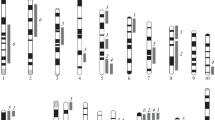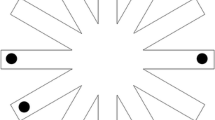Summary
The Water-T-Maze was used to investigate the genetically determined apparatus-dependent behavior of mice. Special importance was attached to the mode of inheritance involved. For this purpose we used NMRI, C3H/HeJ, Balb/c, Balb/cN, DBA/2, C57Bl/6 inbred mouse strains, together with their offspring and the F2-hybrids of C3H/HeJ and DBA/2. Furthermore investigations were carried out to examine the effect of the environment on the expression of behavior. After these experiments had proved that there is a predominantly genetic derivation for behavioral expression, a possible relationship between the conditioning effect and the age of the animals was investigated. The animal's age has quantitative effects on the expression of behavior, but it does not lead to any qualitative behavioral changes. Nevertheless early conditioning of the animals apparently manifests itself in long-term memory. On the whole the mode of inheritance in Water-T-Maze learning appears to imply a polygene-dependent model in which clear dominant effects are present, as shown in the results of the F2-generation. No sex-related differences were observed. In general, the results demonstrate a definite involvement of genetic factors in the areas of conditioning and behavior.
Similar content being viewed by others
References
Buselmaier W, Geiger S, Reichert W (1978) Monogene inheritance of learning speed in C3H and DBA mice. Hum Genet 40:209–214
Buselmaier W, Vierling Th, Balzereit W, Schwegler H (1981) Genetic analysis of avoidance learning using different psychological testing systems with inbred mice as model organisms. Psychol Res 43/3:000
Essman WB, Jarvik ME (1961) A water escape test for mice. Psychol Rep 8:58
Festing MFW (1973) Water escape learning in mice. I. Strain differences and biometrical considerations. Behav Genet 3:13–24
Festing MFW (1973) Water escape learning in mice. II. Replicated selection for increased learning speed. Behav Genet 3:25–36
Festing MFW (1974) Water escape learning in mice. III. A diallel study. Behav Genet 4:111–124
Henderson ND (1972) Relative effects of early rearing environment and genotype on discrimination learning in house mice. J Com Physiol Psychol 79:243–253
Lienert GA (1972) Verteilungsfreie Methoden der Biostatik. Anton Hain, Meisenheim am Glan
Meier GW, Foshee DP (1965) Albinism and water escape performance in mice. Science 147:307–308
Padeh B, Soller H (1976) Genetic and environmental correlations between brain weight and maze learning in inbred strains of mice and their F1-hybrids. Behav Genet 6:31–41
Stasik JH (1970) Inheritance of T-Maze learning in mice. J Comp Physiol Psychol 71:251–257
Weber E (1961) Grundriß der biologischen Statistik. 4. Aufl. Gustav Fischer, Jena
Waller MP, Waller PF, Brewster LA (1960) A water maze for use in studies of drive and learning. Psychol Rep 7:99–102
Winston HD (1964) Heterosis and learning in the mouse. J Comp Physiol Psychol 57:279–283
Winston HD, Lindzey G (1964) Albinism and water escape performance in the mouse. Science 144:189–191
Author information
Authors and Affiliations
Rights and permissions
About this article
Cite this article
Schwegler, H., Buselmaier, W. Behavior genetic analysis of Water-T-Maze learning in inbred strains of mice, their hybrids, and selected second generation crosses. Psychol. Res 43, 335–345 (1981). https://doi.org/10.1007/BF00308456
Received:
Issue Date:
DOI: https://doi.org/10.1007/BF00308456




